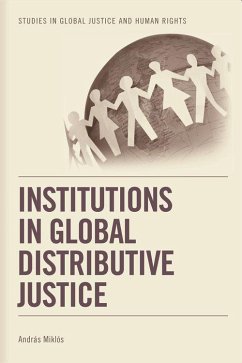STUDIES IN GLOBAL JUSTICE AND HUMAN RIGHTS Series Editor: Thom Brooks This series publishes ground-breaking work on key topics in the area of global justice and human rights including democracy, gender, poverty, the environment and just war. Books in the series are of broad interest to theorists working in politics, international relations, philosophy and related disciplines. The first systematic treatment of the role of institutions in cosmopolitan theories of distributive justice Regarding an institution as a public system of rules which defines positions, rights and duties, this book analyses the effect that social, economic and political institutions have on the justification, scope and content of principles of distributive justice. It asks whether institutions are necessary for generating the requirements of distributive justice, and considers the implications for global justice. And it develops a novel theory about the role political and economic institutions play in determining the content of the requirements of distributive justice, showing how they can affect the application of these requirements. Defending a cosmopolitan conception of distributive justice in which existing institutions do not limit the scope of justice to nation-states, the author argues that some egalitarian distributive requirements have a global reach. Key Features - Connects philosophical argument with concrete issues such as the role of the World Trade Organization, global health inequalities, health worker migration, pharmaceutical patents, states' rights over natural resources, and immigration control - Provides an accessible introduction to the main theories of global justice including Rawlsian cosmopolitanism, luck egalitarian cosmopolitanism, relational versus non-relational theories of justice, nationalism, Rawls' Law of Peoples, and the political conception of justice András Miklós teaches at the Department of Philosophy and the William E. Simon Graduate School of Business at the University of Rochester. Cover image: (c) Lise Gagne/iStockphoto. Cover design: [EUP logo] www.euppublishing.com








